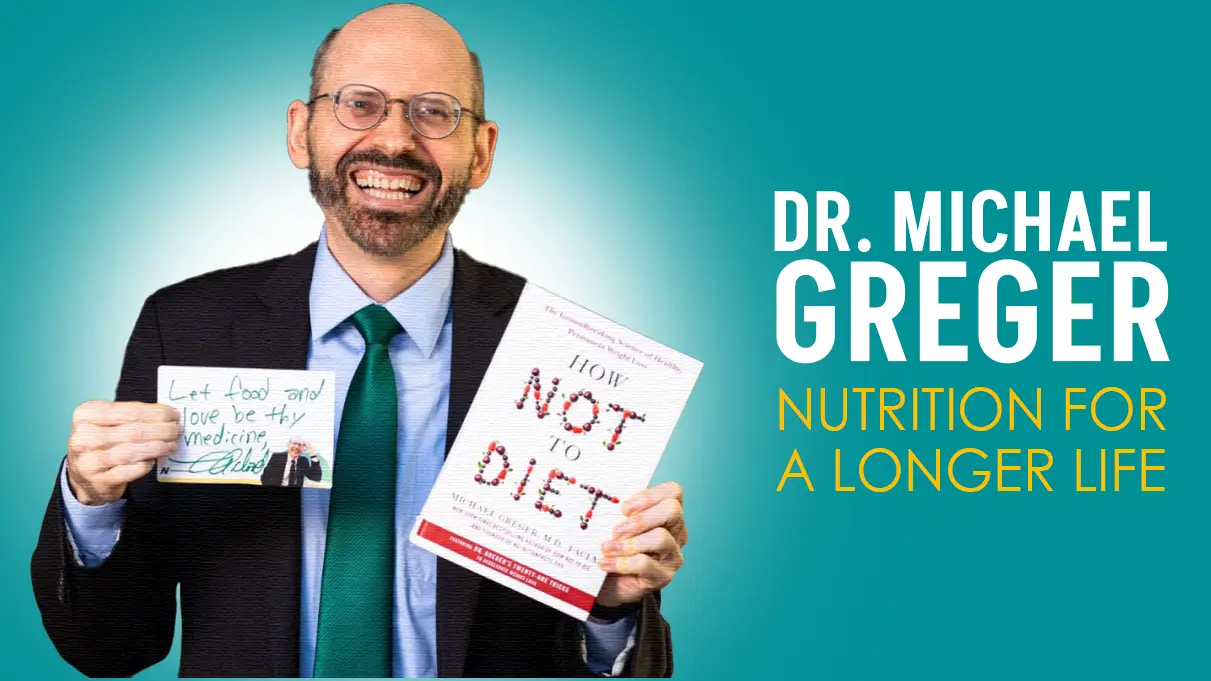
HEALTH NEWS
Dr. Michael Greger, an Expert in Aging, on Optimal Nutrition for a Longer Life
-
Rahul Priydarss

O
ne such luminary in the field is Dr. Michael Greger, a renowned physician, author, and speaker whose evidence-based approach has made him a leading authority on the intersection of nutrition and longevity.
Table of Contents
Introduction:
In the quest for a longer, healthier life, the role of nutrition cannot be overstated. Renowned aging expert Dr. Michael Greger provides invaluable insights into the optimal dietary choices that can contribute to extending our lifespan. As we navigate the complexities of modern healthcare, understanding the impact of nutrition on aging becomes increasingly crucial.
Who Is Dr. Michael Greger:
- Dr. Michael Greger is a physician, best-selling author, and internationally recognized speaker known for his dedication to researching the profound impact of nutrition on health and aging. He is the founder of nutritionfacts.org, a non-profit organization committed to providing evidence-based information on a wide range of health topics.
- Dr. Greger’s expertise in translating complex scientific research into accessible and actionable. And making him a trusted source for individuals seeking to enhance their well-being through informed dietary choices. With a focus on plant-based nutrition and evidence-driven insights, Dr. Michael Greger continues to empower individuals on their journey to a longer, healthier life.
The Foundations of Longevity:
- Dr. Greger emphasizes the importance of adopting a plant-based diet rich in whole foods. Fruits, vegetables, legumes, and whole grains are packed with essential nutrients, antioxidants, and fiber, which collectively contribute to overall health and longevity. Research consistently supports the idea that plant-based diets can reduce the risk of chronic diseases such as heart disease, diabetes, and certain cancers.
- Only 4 factors maintain our aging and longer life:
- Power of Antioxidants
- Omega-3 Fatty Acids for Brain Health
- Role of Protein in Aging
- Impact of Caloric Restriction
1- Power of Antioxidants: Antioxidants play a pivotal role in neutralizing free radicals, which are unstable molecules that can damage cells and contribute to the aging process. Dr. Greger advocates for a diet abundant in colorful fruits and vegetables, as they are natural sources of antioxidants. Berries, leafy greens, and nuts are particularly high in these powerful compounds, offering a delicious way to support cellular health.
2- Omega-3 Fatty Acids for Brain Health: As we age, maintaining cognitive function becomes a priority. Omega-3 fatty acids, found in abundance in fatty fish, flaxseeds, and walnuts, are known for their brain-boosting properties. Dr. Greger encourages the incorporation of these foods into our diet to support brain health and potentially reduce the risk of age-related cognitive decline.
3- Role of Protein in Aging: Protein is essential for maintaining muscle mass and overall body function, especially as we age. Dr. Greger suggests opting for plant-based protein sources like beans, lentils, and tofu, as they offer a nutrient-rich alternative to animal-based proteins. Balancing protein intake with other essential nutrients promotes healthy aging and prevents muscle loss.
4- Impact of Caloric Restriction: Research has shown that caloric restriction, without malnutrition, can have a positive impact on longevity. Dr. Greger explores the concept of consuming fewer calories while still meeting nutritional needs. This approach may not only contribute to a longer life but also help manage weight and reduce the risk of age-related diseases.

Tips for Incorporating Dr. Greger’s Insights:
- Diversify Your Plate: Aim for various colorful fruits and vegetables to ensure a broad spectrum of nutrients.
- Include Omega-3s: Incorporate fatty fish, flaxseeds, and walnuts into your meals to support brain health.
- Choose Plant-Based Proteins: Explore the world of plant-based protein sources to promote muscle health and overall well-being.
- Practice Caloric Awareness: Consider mindful caloric consumption,
- focusing on nutrient-dense foods to support longevity.
Frequently Asked Questions (FAQs):
A1: Dr. Michael Greger recommends a plant-based diet rich in fruits, vegetables, legumes, and whole grains due to their abundance of essential nutrients, antioxidants, and fiber. This dietary choice has been linked to a reduced risk of chronic diseases, contributing to overall health and longevity.
A2: Antioxidants neutralize free radicals and unstable molecules that can damage cells and accelerate aging. Dr. Greger emphasizes the consumption of colorful fruits and vegetables, which are natural sources of antioxidants. Incorporating these foods into your diet supports cellular health and helps counteract the effects of aging.
A3: Omega-3 fatty acids, found in fatty fish, flaxseeds, and walnuts, are crucial for brain health. Dr. Greger suggests including these foods in your diet to support cognitive function and potentially reduce the risk of age-related cognitive decline.
A4: Research indicates that caloric restriction, without malnutrition, may contribute to a longer life. Dr. Greger explores the concept of consuming fewer calories while still meeting nutritional needs. This approach not only supports longevity but can also help manage weight and reduce the risk of age-related diseases.

-Remember, Always consult with healthcare professionals or Doctors for personalised advice related to medical conditions.
In Conclusion:
Dr. Michael Greger’s insights into optimal nutrition for a longer life provide a roadmap for making informed dietary choices. By embracing a plant-based, nutrient-rich diet and adopting healthy lifestyle practices, we can proactively contribute to our overall well-being and extend the quality of our lives. As we navigate the journey of aging, the power to enhance our health and longevity lies on our plates.
Previous Post




